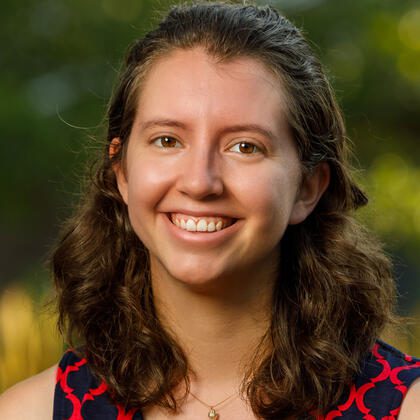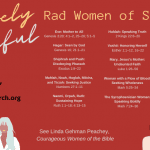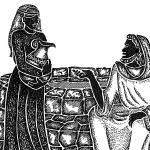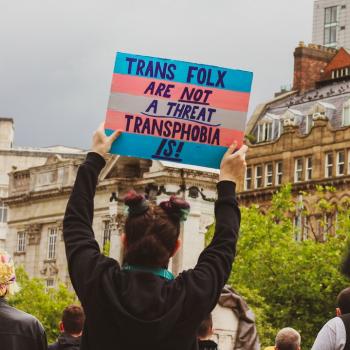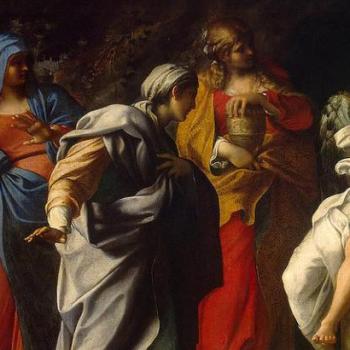Mother Tekoa: Bringing Wisdom
By Susannah M. Larry
Read 2 Samuel 14:1–24
The summer I turned twenty-one, I lived at an intentional Christian community called Jubilee Partners in Comer, Georgia. Just as I came of age by the weird standards of our culture, I came of age spiritually in that community of Christ followers who were committed to peace and justice. The Jubilee Partners folks were an unconventional group of United States citizens and refugees from around the world that chose to make a rural farm home. That summer, I learned more deeply what it would mean to follow Jesus.
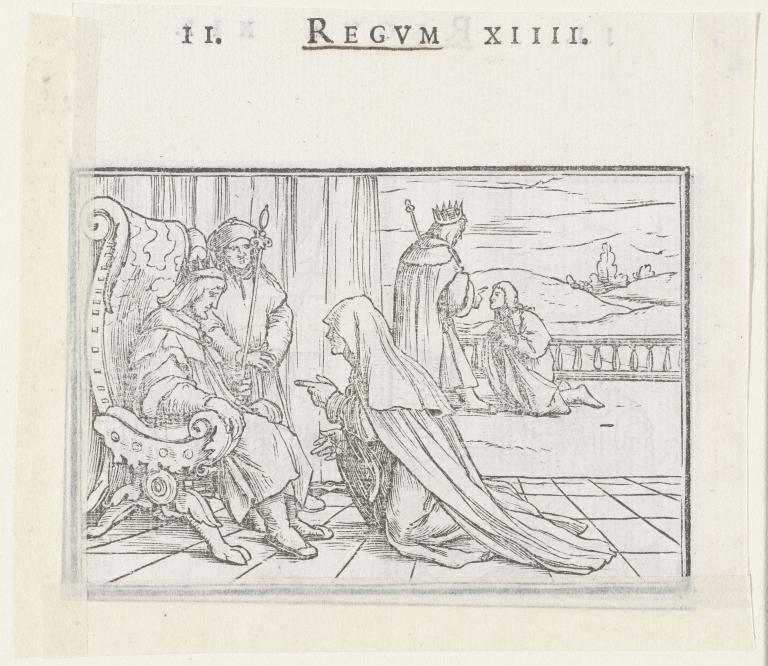
When I think about the rad women of Scripture, when I think about the Wise Woman of Tekoa, I see in my mind centenarian Coffee, sitting in her lawn chair outside the Georgia capitol building, holding up her sign. In a way, that mental picture I have feels pathetically hopeless. A man is about to die by lethal injection, sanctioned by the highest ranking official in Georgia, and his most committed supporter is…an old woman too frail to stand in protest, whose voice is too soft to call out audible chants, but whose shaking hands hold up a sign in witness? That doesn’t seem like a recipe for effective advocacy.
And neither, it would seem, is the Wise Woman of Tekoa’s witness to King David. Actually, I’m going to call her Mother Tekoa, because the Bible doesn’t tell us her name, even. But it’s to her that the call to speak truth to power comes. King David, we know, has effective power over life and death. It’s ironic how Mother Tekoa flatteringly calls David “an angel of God, discerning good and evil,” because at times David has acted like an angel of death, delivering judgment whenever he wants. If we flip back the pages of 2 Samuel, we can see the king’s unjust use of power in how he slaughtered Uriah the Hittite to cover up his own adultery.
As we know, the Bible’s family stories are as complicated as our own. The person who now faces David’s wrath is Absalom, David’s own son and a complicated and compelling character in the story. Absalom is a devoted brother who sought to avenge his sister, Tamar, whom Amnon, their half-brother, raped. Absalom becomes angry that David has not held Amnon accountable for the rape, as Amnon unfortunately was David’s favorite son. So Absalom has murdered Amnon for the rape, and then must flee for his life. The king’s nephew, Joab, who is also the commander-in-chief of David’s army, wants to see Absalom restored into David’s good graces for reasons of his own. But Joab doesn’t feel like he can petition David himself to restore Absalom. So Joab conscripts Mother Tekoa to fool David into seeing the error of his ways and accepting Absalom back. The woman is to disguise herself as a widow and spin a false tale for the king.
The story that Joab concocts, and that the woman repeats, is this: Her two sons have been fighting, and one kills the other. (This scenario might remind us of Cain and Abel’s famous fight.) There was no one to separate them. By law, the murderous brother is now to be killed by the “avenger of blood,” the next-of-kin of the dead man. But allowing this retribution would deprive this already-vulnerable widow of both her sons. If the woman stands in the way of her son’s execution, then she could be liable to receive the punishment of death. So-called justice, retributive justice, makes everyone poorer, more endangered.
The point of having the woman tell this made-up story is to get David to realize the flaw in his own retribution against Absalom. If he could extend mercy to the widow’s murdering son, couldn’t he show mercy to his own? Couldn’t Absalom come home again? Yes, and yes, it turns out. Joab’s scheme works, and David agrees to let Absalom come back home. This happens even though David eventually sees through the ruse, asking the wise woman if Joab put her up to the task.
At first glance, we might wonder if Mother Tekoa is actually a major character here; after all, we are told that Joab puts the words in her mouth. But I don’t think that’s the whole story, for two reasons. First, the woman is called “wise.” Wisdom, in ancient Hebrew literature, suggests a special awareness of the world, an understanding of how things really are. It can also suggest a practical agency, the know-how to get things done. And finally, it can suggest an insight into the nature of God and humanity.
Knowing that, I don’t believe that the wise woman is just a puppet of Joab in the story or his passive mouthpiece. Joab could have picked anybody to talk to King David if the woman didn’t have any special qualities of her own. The fact that she was “wise” must have affected his selection.
Second, there’s a portion of the woman’s speech that’s a different tone from all the rest. For the most part, the woman is acting the role of widowed, bereaved mother that Joab has assigned her. She sticks with the story. But then there’s a moment in the text that’s deeply profound, seemingly interrupting the script handed to her. The woman in the story moves from scripted speech to her own improv. It’s at this moment that her “wisdom,” that deep understanding of the nature of God and the ways of the world, comes forward. Here’s what she says:
We must all die; we are like water spilled on the ground, which cannot be gathered up. But God will not take away a life; he will devise plans so as not to keep an outcast banished forever from his presence. (2 Sam. 14:14)
“God will not take away a life.” That’s not a message we normally associate with the Old Testament. We’re so accustomed to thinking about God’s wrath and judgment in the Old Testament that we’re inclined to overlook the incredible moments of mercy and grace within it. The witness of Mother Tekoa is that in God’s incredible goodness, justice and mercy become intertwined. Even when we think, like David, that no restoration is possible in a situation, that that a person is no longer capable of carrying God’s light and love, God still is not done. God keeps searching for ways to bring the outcast back home, to restore relationship, and to mend what is shattered. Mother Tekoa’s words here transcend the political machinations of Joab, who has his own agenda for wanting Absalom restored. These are prophetic words of witness to the nature of God, coming not from Joab but straight from God’s own heart.
Today our focus is on Mother Tekoa and the witness she bears to the justice and mercy of God. I want to fully honor her voice in its own right, and yet I’m struck with how closely her words align with what will become the message of Jesus Christ’s restorative love in the New Testament. When he’s on the cross, dying between two thieves in Luke’s story, Jesus communicates the persistence of God’s love. While one thief mocks Jesus, Luke tells us that the other thief expresses shame about his actions, remarking that he is justly condemned. Jesus does not deny the condemnation, but instead tells him, “Today you will be with me in paradise” (Lk. 23:42) There’s a relentless pursuit that’s part of the nature of God’s love, threading through the great biblical salvation story that passes through Mother Tekoa, countless other saints of our faith, and ultimately to Jesus.
That Good News of God’s persistent grace and restoring love is the message that resounds also in Paul’s words in Rom. 8:38-39:
For I am convinced that neither death, nor life, nor angels, nor rulers, nor things present, nor things to come, nor powers, nor height, nor depth, nor anything else in all creation, will be able to separate us from the love of God in Christ Jesus our Lord.
The scandalous truth of the Gospel, spoken through Mother Tekoa in 2 Samuel, is that God hasn’t given up on people even when we’ve given up on them. God’s mercy, God’s justice, God’s passion for shalom, are never limited by the constraints we place on them. What we deem screwed up people or screwed up situations are God’s workshop for hope and transformation. As beloved children of this God, we, like wise Mother Tekoa, are called to keep speaking the truth that God’s reconciling work isn’t finished yet.
Sometimes, this witness appears fruitless. Mother Tekoa’s powerful preaching compels King David to bring Absalom back to the city, but he doesn’t go into his father’s presence for years. Ultimately, the fault lines in the relationship between Absalom and David are so deep that the two permanently part and are at war. In the end, this war will kill Absalom, unreconciled in this life to David.
And, circling back now to another wise woman’s witness, Roy’s story doesn’t have a hopeful ending, either. As a young, idealistic Christian, I’d had the fantasy that a witness like Coffee’s would magically bring restoration. This was not the case. The state of Georgia executed Roy Blankenship by lethal injection on June 23, 2011. Does the witness of Coffee, the witness of Mother Tekoa, really matter, if on this earth the end comes through violence?
Because, fair enough, Absalom and Roy are dead and buried. I was even there when Roy was buried. Rather than in an unmarked grave in a Georgia prison cemetery, Roy requested burial at the Christian community, at Jubilee Partners, so that his family and friends would have a gravesite to visit. Community members shoveled mounds and mounds of heavy Georgia red dirt, blistering hands and straining backs, to make a resting place for a man who had raped and murdered and yet who, in the mystery of God’s mercy and justice, was God’s beloved child. Coffee bore witness once again, this time, her lawn chair sitting just outside the gravesite. Together, we sang the song written by Bob Fergeson in 1958,
When troubles surround us
when evils come;
The body grows weak,
The spirit grows numb,
When these things beset us,
He doesn’t forget us
He sends down His love.
On the wings of a dove.
God doesn’t forget us. Friends, the witness of Coffee, the witness of Mother Tekoa, matters even in death, even when the restoration they preached didn’t fully manifest. Because it was the foolishness of the cross to which their lives witnessed: the foolishness of love resisting retributive violence, drawing in outcasts where empire only draws lines to keep out. For God, Mother Tekoa’s witness tells us, does not take away a life. God keeps trying to make a way to bring everyone back home.
So for the witness of Mother Tekoa,
a powerful woman of Scripture,
For the witness of Coffee Worth,
a powerful woman of faith,
And for the witness of saints unknown to us,
powerful women and men of God,
We give you thanks and praise, Lord.
Amen.

